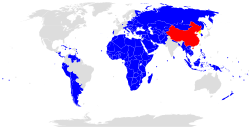SCO Development Bank
The SCO Development Bank is a proposed multilateral financial institution. Since 2010, China has sought to expand financial cooperation under the auspices of the Shanghai Cooperation Organisation by setting up the bank. Russia however has shown skepticism to the bank and in general has prioritized security cooperation within the SCO rather than economic projects. Russia has alternatively suggested to China to buy a stake in the Russian led Eurasian Development Bank. The Asian Infrastructure Investment Bank was established in 2015 and has substituted the proposed role of the SCO Development Bank to fund infrastructure projects in the region. [4]
2019 SCO Bishkek summit
Despite the delays, there still remains support among member states for creating the bank. Pakistani Prime Minister Khan at the 2019 SCO Summit called for the bank and an SCO development fund to be expeditiously created. [5]
This page is based on this
Wikipedia article Text is available under the
CC BY-SA 4.0 license; additional terms may apply.
Images, videos and audio are available under their respective licenses.
